

Career options contents. Career options for researchers. Are you unsure what to do next?
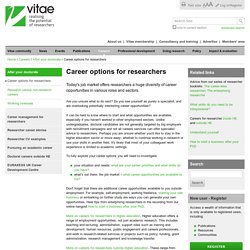
Do you see yourself as purely a specialist, and are overlooking potentially interesting career opportunities? It can be hard to know where to start and what opportunities are available, especially if you haven't worked in other employment sectors. Unlike undergraduates, doctoral candidates are not generally targeted by big employers with recruitment campaigns and not all careers services can offer specialist advice to researchers.
Undecided? Undecided?
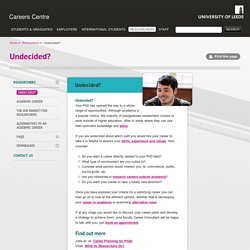
Undecided? Your PhD has opened the way to a whole range of opportunities. Although academia is a popular choice, the majority of postgraduate researchers choose to work outside of higher education, often in areas where they can use their specialist knowledge and skills. Research versus non-research careers. Research careers Doctoral research training is challenging and thorough.
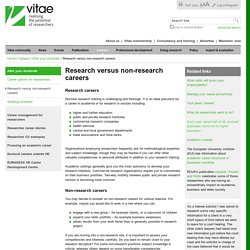
It is an ideal precursor for a career in academia or for research in sectors including: higher and further educationpublic and private research institutescommercial research companieshealth servicescentral and local government departmentstrade associations and think-tanks. Organisations employing researchers frequently ask for methodological expertise and subject knowledge, though they may be flexible if you can offer other valuable competencies or personal attributes in addition to your research training. Academic settings generally give you the most autonomy to develop your research interests. Non-research careers You may decide to embark on non-research careers for various reasons. Engage with a new group – for example clients, or a classroom of childrenexpand your skills portfolio – for example business awarenessobtain results from your work faster than is generally possible in research project.
What do researchers do? What do researchers do WDRD by subject Vitae Jun 2009. Downloads. Your PhD, what next? Opportunities for PhD graduates to build a career outside of academia are increasing.
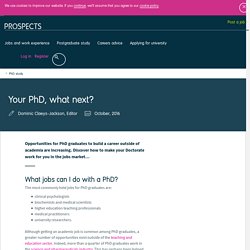
Discover how to make your Doctorate work for you in the jobs market… What jobs can I do with a PhD? The most commonly held jobs for PhD graduates are: clinical psychologistsbiochemists and medical scientistshigher education teaching professionalsmedical practitionersuniversity researchers. Although getting an academic job is common among PhD graduates, a greater number of opportunities exist outside of the teaching and education sector.
If you have aspirations to become a clinical psychologist or educational psychologist you'll need to study for a specific taught Doctorate in clinical (DClinPsy or ClinPsyD) or educational (DEdPsy) psychology respectively. How do I get started in academia? PhD graduates often struggle to gain a permanent academic job immediately. You may find opportunities on individual university websites, but see getting an academic job for more information and advice. Researcher career stories. Useful tools to assess your capabilities and expertise. Employers are likely to ask candidates to talk about themselves, their strengths and areas for development.
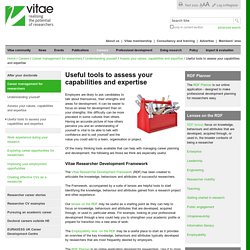
It can be easier to focus on areas for development than on your strengths; this difficulty can be more prevalent in some cultures than others. Having an accurate picture of how others perceive you and an understanding of yourself is vital to be able to talk with confidence and to sell yourself and the value you could add to a team, organisation or project. Of the many thinking tools available that can help with managing career planning and development, the following are those we think are especially useful. Vitae Researcher Development Framework The Vitae Researcher Development Framework (RDF) has been created to articulate the knowledge, behaviours and attributes of successful researchers. The Framework, accompanied by a suite of lenses are helpful tools to start identifying the knowledge, behaviour and attributes gained from a research project and other experience.
Feedback Examples: Understanding yourself. Before researching possible career moves it is useful to spend time understanding yourself, including your capabilities, expertise and personal values.
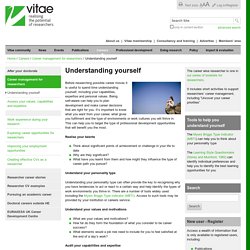
Being self-aware can help you to plan development and make career decisions that are right for you. It’s important to know what you want from your career, what gives you fulfilment and the type of environments or work cultures you will thrive in. This can help you to target the type of professional development opportunities that will benefit you the most. Realise your talents Think about significant points of achievement or challenge in your life to dateWhy are they significant? Being aware of your values. Exploring career opportunities for researchers. Career opportunities for researchers are not always obvious or easy to find.
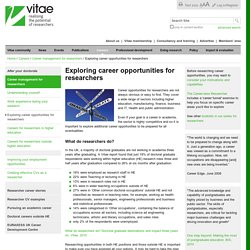
They cover a wide range of sectors including higher education, manufacturing, finance, business and IT, Health and public administration. Even if your goal is a career in academia, the sector is highly competitive and so it is important to explore additional career opportunities to be prepared for all eventualities. What do researchers do? In the UK, a majority of doctoral graduates are not working in academia three years after graduating. A Vitae report found that just 19% of doctoral graduate respondents were working within higher education (HE) research roles three and half years after graduation compared to 26% at six months after graduation. New 'What do researchers want to do?' report now available!
With a new Government innovation and research strategy published in December, Vitae is releasing new research based on views of over 4,500 researchers undertaking doctoral study in the UK.
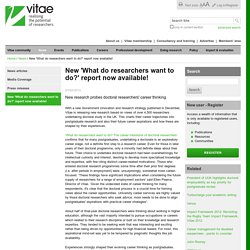
4374. Beyond the PhD. Working overseas. Experience of living and working abroad can help foster long-term collaborations (and friendships).
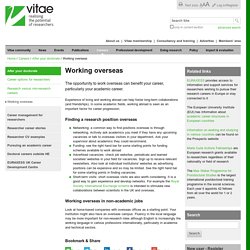
In some academic fields, working abroad is seen as an important factor for career progression. Finding a research position overseas Networking: a common way to find positions overseas is through networking. Actively ask academics you meet if they have any upcoming vacancies or talk to overseas visitors in your department. Ask your supervisor about academics they could recommend.Funding: see the right hand bar for some starting points for funding schemes available to work abroadAdvertised vacancies: check job websites, periodicals and learned societies' websites in your field for vacancies. Working overseas in non-academic jobs Look at home-based companies with overseas offices as a starting point. Academic career. Academic career If you are passionate about your subject, like and are good at research, love being within a university and want to share your knowledge with university students, then an academic career may be for you.
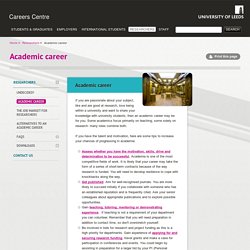
Some academics focus primarily on teaching, some solely on research: many roles combine both. Pursuing an academic career. Many people aspire to an academic career after they complete their doctorate and/or work as a member of research staff. This is highly competitive as only a small percentage of doctoral graduates and research staff go on to have a long term career in academia. This percentage is highly variable by country and subject area. To increase your chance of succeeding in academia you will need a good publications record, experience of teaching, administration, supervision experience, knowledge of funding opportunities, and ideally evidence of successful funding applications.
Experience of professional networking to raise your profile and, increasingly, entrepreneurship or knowledge transfer experience will also be advantageous. An Academic Career (The University of Manchester) EURAXESS. Alternatives to an academic career. Alternatives to an academic career Some researchers relish working in an academic environment, but increasingly PGRs are exploring alternatives, either because they consider it wise to have a plan B or because they find the prospect of using their skills in a completely different organisation appealing. Some students are still reluctant to express interest in a non-academic career as they feel it is expected of them to continue on this path.
However, the employment landscape has changed and there a surprising number of good options for a satisfying career. Your first thought might be to look for a research role outside academia that uses the full range of your skills. However an increasing number of employers would welcome more applications from doctoral graduates and some are actively targeting them. Recognise your transferable skills. Explore careers which utilise your most proficient skills and those you particularly enjoy using. Use your networks. Doctoral careers outside higher education. After a doctorate or post-doctoral contract, an academic career or other role in higher education may seem the most obvious next step in your career.
However, look again. What do researchers do? Doctoral graduate destinations and impact three years on. Vitae, 2010 found that in the UK, only a minority of doctoral graduates (19%) work in higher education research (HE) roles three and a half years after graduating and 22% in HE teaching or lecturing. Most of the rest have moved into roles outside HE in sectors such as healthcare, education, engineering and business. Researchers in Schools. RIS Researchers Brochure 2017. What do researchers do Career Profiles of doctoral entrepreneurs Vitae 2010.